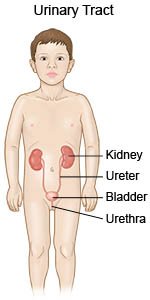Cystoscopy in Children
Medically reviewed by Drugs.com. Last updated on Aug 4, 2025.
AMBULATORY CARE:
What you need to know about your child's cystoscopy:
A cystoscopy is a procedure to look inside your child's urethra and bladder using a cystoscope. A cystoscope is a small tube with a light and magnifying camera on the end. The procedure is used to diagnose and treat conditions of the bladder and urethra.
 |
How you can prepare your child for a cystoscopy:
Your child's healthcare provider will talk to you about how to prepare your child for the procedure. He or she will tell you what medicines your child should take or not take on the day of the procedure. Your child may need to stop eating at midnight the night before the cystoscopy. Your child may need to drink a large amount of liquid before the procedure.
What will happen during the cystoscopy:
Your child will be given general anesthesia to keep him or her asleep and pain free during the procedure. The cystoscope will be will be placed through your child's urethra and into his or her bladder. The urologist will look at the walls of your child's urethra as the scope goes through to his or her bladder. Your child's bladder will be filled with liquid so the urologist can see the inside of his or her bladder more clearly. Tools may be inserted through the cystoscope to treat any problems in your child's urethra or bladder. The provider may also take a sample of tissue and send it to a lab for tests.
What will happen after your child's cystoscopy:
You will be able to take your child home after he or she is fully awake. You may see small amounts of blood in your child's urine. This is normal. It is also normal for your child to have an increased need to urinate. Your child may also have burning or mild discomfort in his or her bladder or kidney area during urination.
Risks of a cystoscopy:
Your child may bleed more than expected or develop an infection. Your child's urethra, bladder, or ureters may get damaged during his or her procedure. He or she may also have abdominal pain. Swelling caused by the cystoscopy may cause a blockage or slow urine flow.
Related medications
Seek care immediately if:
- Your child's urine turns from pink to red, or has clots in it.
- Your child cannot urinate at all and his or her bladder feels full.
- Your child has severe pain.
Contact your child's healthcare provider if:
- Your child's pain or burning becomes worse or lasts longer than 1 day.
- Your child's urine stays pink for longer than 1 day.
- Your child has a fever with or without chills.
- Your child urinates less than usual, or still feels like he or she has to urinate after using the bathroom.
- You have questions or concerns about your child's condition or care.
Medicines:
Your child may be given any of the following:
- Antibiotics help treat or prevent a bacterial infection.
- Acetaminophen decreases pain and fever. It is available without a doctor's order. Ask how much to give your child and how often to give it. Follow directions. Read the labels of all other medicines your child uses to see if they also contain acetaminophen, or ask your child's doctor or pharmacist. Acetaminophen can cause liver damage if not taken correctly.
- Give your child's medicine as directed. Contact your child's healthcare provider if you think the medicine is not working as expected. Tell the provider if your child is allergic to any medicine. Keep a current list of the medicines, vitamins, and herbs your child takes. Include the amounts, and when, how, and why they are taken. Bring the list or the medicines in their containers to follow-up visits. Carry your child's medicine list with you in case of an emergency.
Care for your child after a cystoscopy:
- Have your child drink liquids as directed. Your child's healthcare provider may recommend that he or she drink more water than usual for 2 days after the procedure.
- Ask when your child can return to regular daily activities. Your child's healthcare provider may recommend that your child rest after the procedure.
Follow up with your child's healthcare provider as directed:
Write down your questions so you remember to ask them during your child's visits.
© Copyright Merative 2025 Information is for End User's use only and may not be sold, redistributed or otherwise used for commercial purposes.
The above information is an educational aid only. It is not intended as medical advice for individual conditions or treatments. Talk to your doctor, nurse or pharmacist before following any medical regimen to see if it is safe and effective for you.
Further information
Always consult your healthcare provider to ensure the information displayed on this page applies to your personal circumstances.
